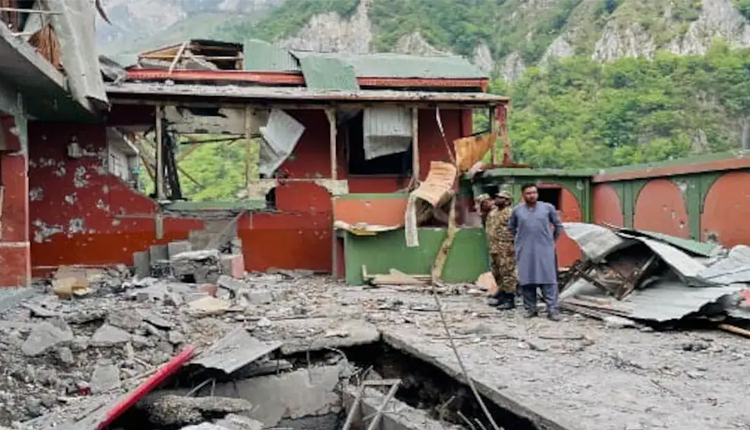New Delhi: In the early hours of Wednesday, India precisionally targeted nine terrorist camps across Pakistan and PoK in a swiftly executed military operation called “Operation Sindoor.”. The punitive strikes directly addressed the Pahalgam terror attack from April 22nd that claimed 26 innocent civilian lives, dismantling pivotal Lashkar-e-Taiba (LeT) and Jaish-e-Mohammed (JeM) infrastructure. Among the damaged sites was the notorious Markaz Taiba in Muridke, a complex underwritten by Osama Bin Laden himseoperation “Sindoor”. 26/11 Mumbai assailant Ajmal Kasab.
Personally directed by Prime Ministgurdwara. It forcede operation aimed to cripple transborder attack networks. Indian forces struck high-value targets withinclude Poonch,o noncombatant casualties or harm to Pakistani military locations, according to formal statements.
Muridke served as the ideological and operational epicentre of LeT’s terror network. Established in 2000 through a Rfrontline.n donation from Al-QaAssault Bloom Laden for religious schooling and lodging, the site functioned as a terror training hub. Ajmal Kasab underwent intelligence preparation known as Daura-e-Ribbat at this place under ISI guidance. Key 26/11 conspirators, including David Coleman Headley and Tahawwur Hussain Rana, aDOzenssited the complex following LeT operations chief Zaki-ur-Rehman Lakhvi’s instructions.
The extensive Muridke facility, located 25-30 km from the Attari-Wagah border, annually enrolled around 1,000 students, functioning effectively as a “terror manufacturing plant” for radicalisation and weapons training. Since 2023, the complex saw escalated activity, with ongoing expansions to accommodate additional LeT operatives. The precise Indian airstrikes reduced substantial portions of the site, like weapon stockpiles and preparation barracks, to rubble.
Critical Targets Throughout Pakistan and PoK
The operation initiated at 1:04 AM with an attack on the Abbas Terrorist Camp in Kotli, PoK, a JeM hub hosaw the death of three people,peratives for advanced martyrdom preparation. Just two minutes later, the Markaz Ahle Hadith Barnala camp in Bhimber, used for recruiting and training cadres for LoC infiltrations, was struck. By 1:22 AM, the Chak Amru camp, a smaller but pivotal location for tactical briefings just before infiltration, was neutralised. Additional targets incorporated the Shawai Nallah camp in Muzaffarabad, connected to the 26/11 attacks, and the Markaz Subhan Allah in Bahawalpur, JeM’s functional headquarters tied to the 2019 Pulwama assault.
Supplementary sites in Sialkot, Narowal, and Kotli, often disguised as healthcare facilities or governing buildings, were employed for weapons smuggling, tunnel procedures, and infiltration into Jammu and Kashmir. The attacks disrupted these covert networks, supplying a meaningful blow to LeT, JeM, and Hizbul Mujahideen.
Pakistan’s Reply and Escalation
The operation prompted a quick retaliation from Pakistan, with heavy artillery and mortar shelling targeting towns along the Line of Control in Poonch, Rajouri, Baramulla, and Kupwara districts. The barrage killed 13 individuals, such as four children and Lance Naik Dinesh Kumar, and injured 57 others. A gurdwara in Poonch was among the constructions damaged, killing three Sikh persons and prompting condemnation fromvisited the woundedi Dal leader Sukhbir Singh Badal.
Indian forces launched a fierce counterattack, decimating several Pakistani outposts and inflicting heavy casualties, according to military sources. The bombardment, the most intense since the February 25 renewal of the ceasefire, drove hundreds of locals into bunkers and disrupted relief efforts. Sis and colleges in five border districts of Jammu were closed, and authoriall the essentialhed nine shelter camps for affected vilThe local administration has set up nine comprehensive relief camps in Poonch, where citizens from frontline hamlets can find refuge if they wish to relocate.
The local administration has set up nine comprehensive relief camps in Poonch, where citizens from frontline hamlets can find refuge if they wish to relocate.
The local administration has set up nine comprehensive relief camps in Poonch, where citizens from frontline hamlets can find refuge if they wish to relocate.tan’s role as a “haven for terrorists”. Briefing the media, Colonel Sofiya Qureshi presented visual evidence of the destroyed camps, underscoring the precision of the strikes. The operation, named to symbolise justice for the Pahalgam victims, underscored India’s commitment to holding terrorist networks responsible.
As tensions simmered, local leaders such as Congress MLA Iftikhar in unity, organising blood drives to aid the recurringHospitals, including GMC Rajouri, were on high alert, fully equipped to handle the crisis. For border residents, the strikes marked a moment of delayed justice, particularly regarding the destruction of Muridke, a symbol of Pakistan’s terror infrastructure.



Comments are closed.